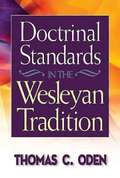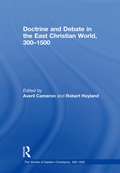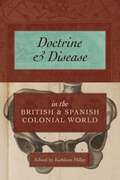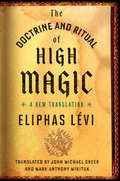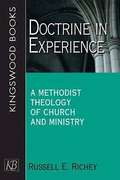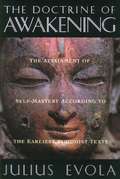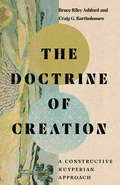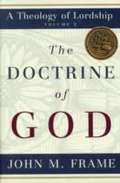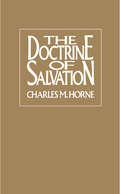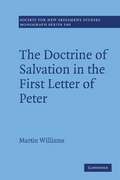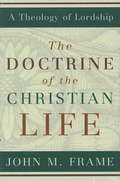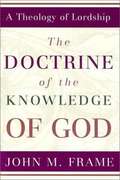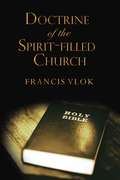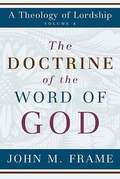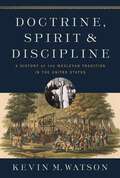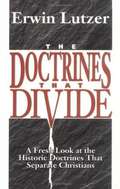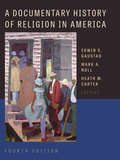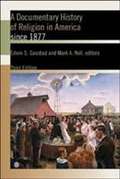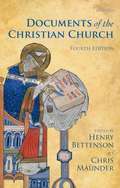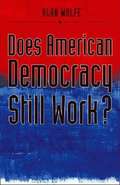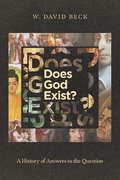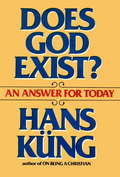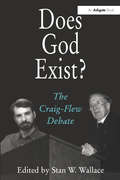- Table View
- List View
Doctrinal Standards in the Wesleyan Tradition: Revised Edition
by Thomas C. OdenThe history of Wesleyan family of churches doctrines What are our core beliefs? Doctrinal Standards in the Wesleyan Tradition, Revised Edition, narrates the history of the formation of Wesleyan doctrines, describing how they were transplanted from the British Isles to North American, how they became constitutionally protected in Wesleyan-rooted churches. The first edition of this book affected the outcome of the 1988 General Conference of The United Methodist Church as the delegates decided many then-disputed doctrinal issues. This revised edition addresses the continuing hunger for more precise and useful information on the doctrinal traditions of mainline Protestantism. Hence the arguments have been updated with more than 400 changes. Included are doctrinal statements for the Evangelical United Bethren, Free Methodist, Methodist Protestant, Wesleyan, Nazarene, African Methodist Episcopal Zion, Christian Methodist Episcopal, and African Methodist Episcopal Churches; as well as an outline syllabus of a Course on the Articles of Religion.
Doctrine and Debate in the East Christian World, 300–1500 (The Worlds of Eastern Christianity, 300-1500)
by Averil Cameron and Robert HoylandThe reign of Constantine (306-37), the starting point for the series in which this volume appears, saw Christianity begin its journey from being just one of a number of competing cults to being the official religion of the Roman/Byzantine Empire. The involvement of emperors had the, perhaps inevitable, result of a preoccupation with producing, promoting and enforcing a single agreed version of the Christian creed. Under this pressure Christianity in the East fragmented into different sects, disagreeing over the nature of Christ, but also, in some measure, seeking to resist imperial interference and to elaborate Christianities more reflective of and sensitive to local concerns and cultures. This volume presents an introduction to, and a selection of the key studies on, the ways in which and means by which these Eastern Christianities debated with one another and with their competitors: pagans, Jews, Muslims and Latin Christians. It also includes the iconoclast controversy, which divided parts of the East Christian world in the seventh to ninth centuries, and devotes space both to the methodological tools that evolved in the process of debate and the promulgation of doctrine, and to the literary genres through which the debates were expressed.
Doctrine and Disease in the British and Spanish Colonial World
by Kathleen MillerDuring the early modern period, unprecedented migration caused diseases to take hold in new locales, turning illness and the human body into battlegrounds for competing religious beliefs as well as the colonial agendas in which they were often ensnared. This interdisciplinary volume follows the contours of illness, epidemics, and cures in the early modern British and Spanish Empires as these were understood in religious terms.Each chapter of this volume centers on a key moment during this period of remarkable upheaval, including Jesuit co-optation of Indigenous knowledge in Peru, the Catholic Church’s dissemination of the smallpox vaccine across the Spanish Empire, Puritan collective fasting during smallpox outbreaks, and the practice of eating dirt as Obeah resistance among enslaved people in Jamaica. Throughout, the contributors explore how the porous geographical borders of the transatlantic world meant that medicine and religion were translated through and against each other, over and over again. Residing at the nexus between two largely discrete areas of inquiry, this collection provides significant insight into the numerous points of juncture between medicine and religion in the Atlantic world.In addition to the editor, the contributors to this volume include Matthew James Crawford, Crawford Gribben, Rana A. Hogarth, Philippa Koch, Allyson M. Poska, Catherine Reedy, and Rebecca Totaro.
The Doctrine and Ritual of High Magic: A New Translation
by Eliphas Lévi John Michael Greer Mark Anthony MikitukFilling a huge gap in our spiritual culture, here--at last--is a comprehensive and elegant translation of the 1854 French masterwork of occult philosophy.The Doctrine and Ritual of High Magic reignited the esoteric spiritual search in the West and led to the emergence of Madame Blavatsky, Manly P. Hall, and the New Age revolution.Lévi's study of magic is an absolute must for every seeker in occult, esoteric, and druidic realms; but this need has been frustrated by dated and inaccurate translations--until now. Greer, a respected occult scholar, and Mikituk, a masterful translator, collaborate to restore this landmark work--complete with its original illustrations and symbols--to the center of the alternative spiritual canon.From the Trade Paperback edition.
Doctrine In Experience: A Methodist Theology of Church and Ministry
by Russell E. RicheyA fresh way to look at the ministry of The United Methodist Church. United Methodism is often accused of having an incoherent theological center. By examining the history and salient features of the church, this book says that United Methodist theology is actually appropriated from its experience as a missional corporate body. This allows United Methodist to do theology in new ways and to better adapt to its multivalent contexts.
The Doctrine of Awakening: The Attainment of Self-Mastery According to the Earliest Buddhist Texts
by Julius EvolaIn a probing analysis of the oldest Buddhist texts, Julius Evola places the doctrine of liberation in its original context. The early teachings, he suggests, offer the foremost example of an active spirituality that is opposed to the more passive, modern forms of theistic religions. This sophisticated, highly readable analysis of the theory and practice of Buddhist asceticism, first published in Italian in 1943 , elucidates the central truths of the eightfold path and clears away the later accretions of Buddhist doctrine. Evola describes the techniques for conscious liberation from the world of maya and for achieving the state of transcendence beyond dualistic thinking. Most surprisingly, he argues that the widespread belief in reincarnation is not an original Buddhist tenet. Evola presents actual practices of concentration and visualization, and places them in the larger metaphysical context of the Buddhist model of mind and universe. The Doctrine of the Awakening is a provocative study of the teachings of the Buddha by one of Europe's most stimulating thinkers.
The Doctrine of Creation: A Constructive Kuyperian Approach
by Craig G. Bartholomew Bruce Riley AshfordApart from the doctrine of God, no doctrine is as comprehensive as that of creation. It is woven throughout the entire fabric of Christian theology. It goes to the deepest roots of reality and leaves no area of life untouched. Across the centuries, however, the doctrine of creation has often been eclipsed or threatened by various forms of gnosticism. Yet if Christians are to rise to current challenges related to public theology and ethics, we must regain a robust, biblical doctrine of creation. According to Bruce Ashford and Craig Bartholomew, one of the best sources for outfitting this recovery is Dutch neo-Calvinism. Abraham Kuyper, Herman Bavinck, and their successors set forth a substantial doctrine of creation's goodness, but recent theological advances in this tradition have been limited. Now in The Doctrine of Creation Ashford and Bartholomew develop the Kuyperian tradition's rich resources on creation for systematic theology and the life of the church today. In addition to tracing historical treatments of the doctrine, the authors explore intertwined theological themes such as the omnipotence of God, human vocation, and providence. They draw from diverse streams of Christian thought while remaining rooted in the Kuyperian tradition, with a sustained focus on doing theology in deep engagement with Scripture. Approaching the world as God's creation changes everything. Thus The Doctrine of Creation concludes with implications for current issues, including those related to philosophy, science, the self, and human dignity. This exegetically grounded constructive theology contributes to renewed appreciation for and application of the doctrine of creation—which is ultimately a doctrine of profound hope.
The Doctrine of God (A Theology of Lordship, Volume #2)
by John M. FrameReaders familiar with Frame's analysis of historic doctrines and current questions will welcome this long-awaited second installment in the Theology of Lordship series. Here he examines the attributes, acts, and names of God in connection with a full spectrum of relevant theological, ethical, and spiritual issues.
The Doctrine of Salvation
by Charles HorneIs anything more important than understanding eternal salvation?When it comes down to it, all human beings can be divided into two categories: the saved and the unsaved. Every person longs to find the path to eternal life. Many different paths are tried. But what does the Word of God have to say about it?In The Doctrine of Salvation, Charles Horne explains the basics of this important biblical doctrine. Why is there a need for salvation? What is its basis? What are its results? How can you be assured of it? And how does salvation culminate in eternal life?Using clear and precise language, Dr. Horne lays out the biblical evidence. &“The doctrine of salvation is central to the message of Scripture,&” he writes. &“From Genesis 3 to Revelation 22 we witness the unfolding drama of redemption.&” May this book open your eyes to the greatest story ever told!
The Doctrine of Salvation
by Charles HorneIs anything more important than understanding eternal salvation?When it comes down to it, all human beings can be divided into two categories: the saved and the unsaved. Every person longs to find the path to eternal life. Many different paths are tried. But what does the Word of God have to say about it?In The Doctrine of Salvation, Charles Horne explains the basics of this important biblical doctrine. Why is there a need for salvation? What is its basis? What are its results? How can you be assured of it? And how does salvation culminate in eternal life?Using clear and precise language, Dr. Horne lays out the biblical evidence. &“The doctrine of salvation is central to the message of Scripture,&” he writes. &“From Genesis 3 to Revelation 22 we witness the unfolding drama of redemption.&” May this book open your eyes to the greatest story ever told!
The Doctrine of Salvation in the First Letter of Peter
by Martin WilliamsThe prevalence of salvation language in the first letter of Peter has often been acknowledged though rarely investigated in depth. Martin Williams presents a new account exploring the concept of salvation in this theologically rich letter. He brings together the disciplines of hermeneutics, New Testament studies, and systematic and historical theology in order to explore the language of salvation which resonates within the text. The book also elaborates on a methodological level the segregation which has arisen between Biblical studies and theological studies. In doing this, Williams identifies a basis for how there can be interaction between these two different viewpoints. This book will be a valuable resource for students and scholars interested in the exegesis and theology of 1 Peter, the doctrine of salvation and Biblical interpretation.
The Doctrine of the Christian Life (A Theology of Lordship, Volume #3)
by John M. FrameThe third volume of Frame's Theology of Lordship series, this book focuses on biblical ethics. In an age of ethical relativism and suspicion of authority, how can we know what is good, virtuous, or just? Frame surveys non-Christian ethical traditions before setting forth a solidly Christian ethical method. By clarifying biblical norms, life situations, and personal dimensions, he presents a model for decision making that honors God in all aspects of life. Discussions range from natural law and conflict of duties to detailed explorations of the Ten Commandments in connection with questions surrounding worship, the Sabbath, church and state, respect for life and truth, sexuality, and the relation of Christ to culture.
The Doctrine of the Knowledge of God (A Theology of Lordship, Volume #1)
by John M. FrameIn keeping with the conviction that theology is the application of God's word to our lives in all situations, Frame combines trenchant analysis with practical insight and counsel for living in the knowledge of God.
The Doctrine of the Spirit-filled Church
by Francis VlokThe Lord Jesus Christ declared . . . I will build My church: and the gates of hell shall not prevail against it. (Matthew 16:18). Throughout the past two thousand years, the church has proclaimed a variety of methods for people to follow in Jesus’ steps. Yet, few have followed His instructions and built the church according to Christ’s teachings which were entrusted to the ministers in His church. The first church was rooted and grounded in the Apostles’ Doctrine (Acts 2:42) and as such the church was built on the sure foundation. Sadly, it has not always contended for the faith but designed and adopted methods that are not in accordance with Christ’s teachings.Now is the appropriate time for the church to return to the biblical structure and conform to tenets found in the Bible. This book contains all the tenets of the Apostles’ Doctrine in one volume. It expounds the deep truths within the Holy Writ and leads ministers to once again conform to the perfect will of God (Romans 12:1-2).
The Doctrine of the Word of God (A Theology of Lordship, Volume #4)
by John M. FrameThis book discusses God's word in modern theology and how God's word comes to us as his controlling power, meaningful authority, and personal presence.
Doctrine, Spirit, and Discipline: A History of the Wesleyan Tradition in the United States
by Kevin M. WatsonThe definitive history of the Wesleyan movement in the United States.An expansive, substantive history of the Wesleyan tradition in the United States, Doctrine, Spirit, and Discipline offers a broad survey of the Methodist movement as it developed and spread throughout America, from the colonial era to the present day.It also provides an theological appraisal of these developments in light of John Wesley's foundational vision. Beginning with Wesley himself, Watson describes the distinctiveness of the tradition at the outset. Then, as history unfolds, he identifies the common set of beliefs and practices which have unified a diverse group of people across the centuries, providing them a common identity through a number of divisions and mergers.In the midst of the sweeping changes happening in Methodism and the pan-Wesleyan movement today, Watson shows that the heart of the Wesleyan theological tradition is both more expansive and substantive than any singular denominational identity."A fresh, panoramic overview of the history of the Methodist movement. . . Promises to be a standard textbook on the history of Methodism for years to come." —TIMOTHY C. TENNENT, Asbury Theological Seminary
The Doctrines of Election and Justification
by A. W. PinkStudy of the doctrines of election and justification in Christianity
The Doctrines That Divide: A Fresh Look at the Historic Doctrines That Separate Christians
by Erwin W. LutzerLutzer examines various controversies that exist within the broad spectrum of Christianity, presenting the issue and the biblical understanding of the doctrines.
A Documentary History of Religion in America
by Edwin S. Gaustad, Heath W. Carter, Mark A. NollUp-to-date one-volume edition of a standard textFor decades students and scholars have turned to the two-volume Documentary History of Religion in America for access to the most significant primary sources relating to American religious history from the sixteenth century to the present. This fourth edition—published in a single volume for the first time—has been updated and condensed, allowing instructors to more easily cover the material in a single semester.With more than a hundred illustrations and a rich array of primary documents ranging from the letters and accounts of early colonists to tweets and transcripts from the 2016 presidential election, this volume remains an essential text for readers who want to encounter firsthand the astonishing scope of religious belief and practice in American history.
A Documentary History of Religion in America since 1877
by Mark A. Noll Edwin S. GaustadThe second volume covers the period from when the dust of the Civil War has settled to the dawn of the 21st century. The documents are almost all by people actively engaged in religion, and so reflect the course of religion itself rather than an external view of it. The chronological chapters focus on trends or conflicts during specific periods. Annotation ©2004 Book News, Inc., Portland, OR (booknews.com)
The Documents of the Christian Church (Fourth Edition)
by Henry Bettenson Chris MaunderHenry Bettenson published the first two editions of Documents of the Christian Church in 1943 and 1963, respectively. The selections were so well chosen that the Documents became a standard text book which many theologians and church historians will remember from their undergraduate days.
Does American Democracy Still Work?
by Alan WolfeThe past few decades have brought a shift in the nature of American democracy--an alarming shift that threatens such liberal democratic values as respect for pluralism, acceptance of the separation of powers, and recognition of the rights of opposition parties. In this insightful book, political scientist Alan Wolfe identifies the current political conditions that endanger the quality of our democracy. He describes how politics has changed, and he calls for a democracy protection movement designed to preserve our political traditions not unlike the environmental protection movement's efforts to safeguard the natural world. Voters who know little about issues, leaders who bend rules with little fear of reprisal, and political parties that are losing the ability to mobilize citizens have all contributed to a worrisome new politics of democracy, Wolfe argues. He offers a brilliant analysis of how religion and morality have replaced political and economic self-interest as guiding principles, and how a dangerous populism promotes a radical form of elitism. Without laying blame on one party or ideology and without claiming that matters will improve with one party or the other in office, Wolfe instead suggests that Americans need to understand the danger their own indifference poses and take political matters more seriously.
Does God Exist?: A History of Answers to the Question
by W. David BeckDoes God exist? Throughout the history of philosophical and theological reflection, this fundamental question has prompted a range of responses. In one incisive volume, philosopher W. David Beck offers a narrative of pre-Christian, Jewish, Buddhist, Christian, and Islamic arguments for God's existence. Here, readers will encounter both classical and contemporary arguments, including cosmological, teleological, moral, and ontological arguments along with commentary from the author. Explore the history of answers to an essential question and add your own reflections to this ongoing conversation.
Does God Exist?: The Craig-Flew Debate
by Stan W. WallaceThis book presents the most recent debates by leading contemporary philosophers of enduring themes and issues concerning the question of God's existence. William Craig and Antony Flew met on the 50th anniversary of the famous Copleston/Russell debate to discuss the question of God's existence in a public debate. The core of this book contains the edited transcript of that debate. Also included are eight chapters in which other significant philosophers - Paul Draper, R. Douglas Geivett, Michael Martin, Keith Parsons, William Rowe, William Wainwright, Keith Yandell and David Yandell - critique the debate and address the issues raised. Their substantial and compelling insights complement and further the debate, helping the reader delve more deeply into the issues that surfaced. In the two final chapters, Craig and Flew respond and clarify their positions, taking the debate yet one step further. The result of these many contributions is a book which provides the reader with a summary of the current discussion and allows one to enter into the dialogue on this central question in the philosophy of religion.
